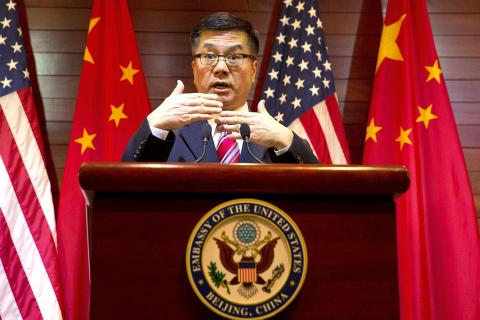Outgoing US Ambassador to China Gary Locke yesterday urged Beijing to respect the rights of peaceful political activists and said Washington was deeply concerned about the fate of a minority academic charged with separatism.
At his final news conference as ambassador, Locke said that Washington is “very concerned” about the case of Ilham Tohti, as well as a recent increase in the arrests of social and legal activists and journalists.
Tohti is an economics professor and advocate for the Uighur Muslim minority who was formally arrested and charged with separatism on Tuesday after being taken from his home one month ago.

Photo: Reuters
China should value not just the economic welfare of its people, but also their freedom of speech, assembly and religion, Locke said.
“We believe that freedom of expression is a universal right and we very much are concerned about the arrest and detentions of people who are engaged in peaceful advocacy,” Locke, accompanied by his wife, Mona, told journalists at the US embassy in Beijing.
US Department of State spokeswoman Jen Psaki on Wednesday also expressed deep concern for Tohti and called for his release.
China’s authoritarian communist government brooks no political opposition and routinely rejects such remarks. Beijing says it must take harsh measures against what it calls Islamic radical terrorists fighting for the independence of the northwestern China Uighur homeland of Xinjiang.
Chinese Ministry of Foreign Affairs spokeswoman Hua Chunying (華春瑩) defended Beijing’s record at a regular briefing on Wednesday and accused the country’s critics of political bias.
Chinese citizens enjoy “unprecedented rights and liberty,” Hua said. “We strongly oppose irresponsible comments made by anybody, regardless of which country he comes from.”
Locke also repeated the US’ calls for restraint in China’s maritime territorial disputes with Japan and its Southeast Asian neighbors. He also urged China to accord foreign journalists working in the country the same equitable treatment that Chinese journalists receive in the West, a reference to Beijing’s denial of visas to reporters from the New York Times and other news outlets.
A former US commerce secretary and two-term governor of Washington state, Locke, 63, was the first Chinese-American to serve as ambassador to Beijing. Known for his affable, non-confrontational style, Locke placed a high priority on improving embassy efficiency and facilitating bilateral trade during his two-and-a-half years in Beijing at a time when exchanges are growing rapidly.

MAKING WAVES: China’s maritime militia could become a nontraditional threat in war, clogging up shipping lanes to prevent US or Japanese intervention, a report said About 1,900 Chinese ships flying flags of convenience and fishing vessels that participated in China’s military exercises around Taiwan last month and in January last year have been listed for monitoring, Coast Guard Administration (CGA) Deputy Director-General Hsieh Ching-chin (謝慶欽) said yesterday. Following amendments to the Commercial Port Act (商港法) and the Law of Ships (船舶法) last month, the CGA can designate possible berthing areas or deny ports of call for vessels suspected of loitering around areas where undersea cables can be accessed, Oceans Affairs Council Minister Kuan Bi-ling (管碧玲) said. The list of suspected ships, originally 300, had risen to about

DAREDEVIL: Honnold said it had always been a dream of his to climb Taipei 101, while a Netflix producer said the skyscraper was ‘a real icon of this country’ US climber Alex Honnold yesterday took on Taiwan’s tallest building, becoming the first person to scale Taipei 101 without a rope, harness or safety net. Hundreds of spectators gathered at the base of the 101-story skyscraper to watch Honnold, 40, embark on his daredevil feat, which was also broadcast live on Netflix. Dressed in a red T-shirt and yellow custom-made climbing shoes, Honnold swiftly moved up the southeast face of the glass and steel building. At one point, he stepped onto a platform midway up to wave down at fans and onlookers who were taking photos. People watching from inside

Japan’s strategic alliance with the US would collapse if Tokyo were to turn away from a conflict in Taiwan, Japanese Prime Minister Sanae Takaichi said yesterday, but distanced herself from previous comments that suggested a possible military response in such an event. Takaichi expressed her latest views on a nationally broadcast TV program late on Monday, where an opposition party leader criticized her for igniting tensions with China with the earlier remarks. Ties between Japan and China have sunk to the worst level in years after Takaichi said in November that a hypothetical Chinese attack on Taiwan could bring about a Japanese

The WHO ignored early COVID-19 warnings from Taiwan, US Deputy Secretary of Health and Human Services Jim O’Neill said on Friday, as part of justification for Washington withdrawing from the global health body. US Secretary of State Marco Rubio on Thursday said that the US was pulling out of the UN agency, as it failed to fulfill its responsibilities during the COVID-19 pandemic. The WHO “ignored early COVID warnings from Taiwan in 2019 by pretending Taiwan did not exist, O’Neill wrote on X on Friday, Taiwan time. “It ignored rigorous science and promoted lockdowns.” The US will “continue international coordination on infectious